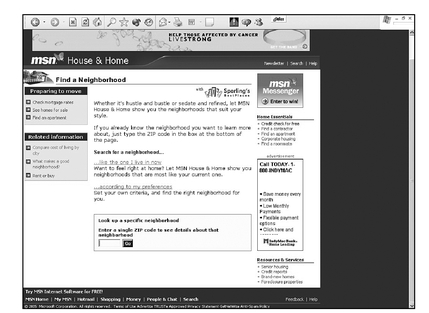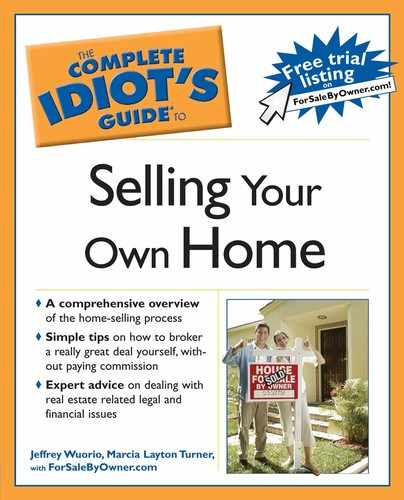Chapter 8
Other Attractions
In This Chapter
• Setting the stage for a sale
• Leveraging your location, location, location
• Collaborating with agents
• Remaining at-the-ready for a showing
Now that your home is on the market, the next step is to entice a buyer to snap it up. And in hot real estate markets, that can happen—overnight sales are not out of the question. But for most of the country, it can take weeks or months to find the perfect match.
During that time, you’ll want to keep your home in tip-top shape, ready to be shown at a moment’s notice. You’ll also want to have plenty of information available to hook a buyer who’s interested. And, depending on how quickly you need to sell your home, you may want to consider offering to pay an agent a partial commission for bringing you a buyer. All of these steps get you that much closer to sealing the deal.
The Home Tour—When Prospective Buyers Are on the Premises
To sell your home, you’re going to need to show it (and show it, and show it …). You may get lucky and sell it to the second or third couple who comes through your door, or it may be the ninety-ninth individual. It’s hard to tell who will end up being “the one”—buyer, that is.

Selling Smarts
Most home showings will take 15-20 minutes, depending on the number of rooms and special features you point out. But don’t be surprised if it takes less.
Which means you need to prepare your home before each and every visitor arrives on your doorstep. Run through your checklist to be certain every room looks as large, clean, clutter-free, and bright as you can make it.
When a potential buyer arrives to tour your home, greet them warmly, give them a general description of the home’s layout, and then offer to give them a tour so you can point out some of the home’s best features.
Generally, you’ll start by showing buyers rooms on the first floor, beginning in the entryway and moving to an adjacent room, such as the living room or dining room. Move room by room, following the natural flow of your home. After they’ve seen the rooms on the first floor, move to the second floor, if you have one. Typically, the master bedroom is of greatest interest, so start there and move to the other bedrooms. After you’ve shown the second floor, you can open the attic, if there is anything to show, and then to the basement, where you should be prepared to answer questions about the heating and cooling system and general maintenance.
Try to begin and end in a cozy room, such as the living room, where perhaps there is a fire in the fireplace, or the kitchen, where a nice snack is laid out. Buyers who are interested now have the perfect opportunity to ask you more detailed questions, such as where the nearest supermarket is or how hard it is to get into a good daycare. With comfy chairs conveniently nearby, you all can sit down and chat until their concerns have been addressed.

Selling Smarts
If you’re feeling pressed for time and in need of a floor-to-ceiling cleaning, consider bringing in a cleaning crew the day before you put your home on the market. For a couple hundred dollars and a few hours, you can get your home in shape to show. Then, over the next few weeks, all you need to do is upkeep. Maintaining a clean appearance is much easier when the hard scrubbing has already been done (by someone else).
After you’ve answered their questions, it’s a good idea to give your visitors some space to “talk amongst themselves.” Excuse yourself to take care of some paperwork in your home office, or to do some cleaning elsewhere so the buyers have the opportunity to discuss the home alone. Let them spend all the time they need to talk about making your home their own.
Always Be Prepared
Let’s face it, few of us keep our homes as clutter-free and spotless on a day-to-day basis as is required when you’re selling it. But that’s what buyers want to see—spic-and-span space. No mail lying on the counter, no overflowing wastebaskets, no unmade beds. No signs of everyday detritus.
To keep your home buyer-ready at a moment’s notice, it’s important to set up a daily routine to keep your place immaculate.

Sales Snafu
One of the worst selling mistakes you can make is to hover or talk too much during a home tour. Buyers are there to consider whether they’d like to live in your home, and they need time to soak in all the features and to gauge whether they feel comfortable there. A seller who refuses to give buyers some space can kill their interest instantly. And endless chatter gets in the way of the buying process. Smart sellers do more listening than talking.
Create a daily checklist that you and your family can quickly run through each morning. Take a sheet of paper and make a list of each room in your home. Then identify places in each room that need regular attention, such as wiping down the counters in the kitchen, cleaning the front of all appliances, and sweeping or mopping the floor.
In the bedrooms, you may want to be sure to make beds, open drapes, clean bathrooms, and vacuum the carpeting. After you’ve made your list, divide the workload so each person is responsible for the upkeep of a portion of your home.
How to Handle Unannounced Visitors
Your yard sign, classified ad, and website should all state that your home will be “Shown by Appointment.” Real estate agents make appointments to show homes, and so should you. But that doesn’t mean potential buyers won’t show up unannounced on your doorstep in the hopes of getting a peek.
Don’t be pressured into letting a potential buyer in for an impromptu showing just because they’re interested. If you know them or have a personal connection and are available, you might consider it. But if they’re strangers coming in off the street, use discretion. Some people will ring your doorbell in the hopes of popping in to check out your home on-the-spot.

Selling Smarts
Whether you’ve decided to host a neighborhood open house or not, you’ll still want to enlist the help of your neighbors in selling your home. You can do that by printing up extra copies of your flyer and distributing them to everyone in your area. Attach a note asking for their help in finding a nice buyer to move into the neighborhood.
Be polite and friendly as you deliver the news that they can’t see it at the moment, but for safety’s sake especially, don’t let anyone in unannounced. They may or may not be legitimate buyers.
Some of you may be comfortable letting people in unannounced, and that’s certainly your call. Just be aware that you may be putting yourself in an unsafe situation.
If the visitors are interested in making an appointment to tour your home on the following day, take down basic contact information like their name, address, and phone number, in case you need to reach them. You could also discreetly note the make and model of their car, as well as the license plate number, as backup information for safety purposes.
How to Handle Telephone Inquiries
With your sign out front, your ad in the newspaper, and the neighbors alerted to your need for a buyer, it’s likely you’ll start to receive phone calls from folks looking for a home in your neighborhood. Buyers calling for the first time may have general questions for you about the home to determine whether it meets their general criteria.
As you answer their questions, try to ask about their needs. What exactly are they looking for? As you get a sense of the size, location, and specific features they are searching for, you can emphasize those same features in your home. If, say, the buyers want to be sure the home has a large back yard, you can tell them about how much space you have and how much your family enjoys it, such as by playing on the swingset that’s back there, or the neighborhood barbeques you enjoy around the grill.
If you get a sense that this home may match their needs, invite them to come by and take a look. Your goal with every call should be to encourage the caller to make an appointment to see it. The only way you’ll sell your home is by having people come through it. After they see all that it has to offer, you’re much more likely to receive an offer to purchase. So aim for an appointment with every call.
When a prospective buyer seems very interested in seeing your home, try to get them in to see it as soon as possible. The more excited about your home the buyer sounds, the quicker you want them to get over to your place. For instance, if they want to come by that evening, do all you can to be available to show it then. The more time that elapses between their initial call and the appointment to see it, the more likely their enthusiasm will wane. They may even find another home they like in the meantime.
One family we know put their home on the market on a Monday morning. Monday afternoon they received a call from a woman who had been looking for a house in their neighborhood and had noticed their FSBO sign out front. She had basic questions about the layout, the space, how recently work had been done on the roof, and other appliance upgrades in that first call and said she would call back to make an appointment to see it. Tuesday morning, she called again, bright and early, anxious to make an appointment to see the home. “How soon would you like to come by?” the seller asked. “How about 4:00 today?” was the response. “Sounds great,” the seller told her. The home was ready to be shown and the seller’s objective was to get the buyer in the home as soon as possible in the hopes of landing a decent offer.
Selling the Setting—How the Neighborhood Helps
Although buyers make the decision to purchase a home based, in large part, on how well it meets their needs for living space, where the home is situated is generally an even more important decision.
FSBO Facts
More than 50 percent of all homes are purchased by family or friends of the people who live nearby, reports real estate website Audrie.com.
Before heading out with buyers, real estate agents will typically try to zero in on what part of town the buyer wants to live in. After that has been determined, they can narrow the focus to the styles of homes that may be of interest to their client, getting as specific as floor layout, number of bedrooms, and size of garage, for example. But the neighborhood decision comes first.
Attracting Out-of-Town Buyers
Your best prospects for buying your home is someone who is ready to buy, has decided they want to live in your neighborhood, and is eager to seal the deal. That description often fits out-of-town or relocated buyers who are moving for a new job or to start over near family.
Few relocating workers have the luxury of looking for weeks on end for that perfect home; in many cases, they settle for the home in their desired neighborhood that best meets their needs, of all the ones available. Which means if your home is one of three on the market in your neighborhood, you have a 33 percent shot at a sale right off the bat. Out-of-town buyers that are under the gun to find a home and move quickly may be less price sensitive, too.
Folks who aren’t familiar with your area will likely start their home search by doing some research on neighborhoods near work, school, or their relatives. You can, too, and get a leg up on how your neighborhood stacks up against those nearby.
To help you emphasize the benefits of living in your area to potential buyers, visit: http://houseandhome.msn.com/pickaplace/nf_Overview.aspx to gather statistics about your neighborhood (see the following figure).

Learn about the average home selling price, median age of residents, and how your area stacks up against regional and national averages for schooling, cost of living, and more.
Working With Agents on a Sale
Despite your efforts to keep real estate agents out of the selling process, you may find they are an excellent source of prospects. Many agents are on the lookout for a particular kind of home to meet the needs of one or more buyers, which is especially true for relos (people relocating). If your place happens to fit a buyer’s list of criteria, the agent is going to want to show it to them. Because your goal is to sell your home as quickly and for as much money as possible, you may want to consider allowing an agent to bring a buyer by.
Depending on the buyer’s arrangement with the agent, the agent may already be receiving his or her commission directly from the buyer, in which case, you’d still owe the agent nothing even if they arranged the sale.
However, if the agent is expecting to be paid a commission from the seller—that would be you—you need to think long and hard about whether you’re willing to pay out a 3 percent commission. One of the reasons you probably decided to sell your home yourself was to avoid writing large checks to real estate agents. Then again, if your home has been on the market for awhile, you may be willing to part with some cash to reduce the stress of the whole process.

Tools of the Trade
Buyers who are moving to a new city for work are called relocations, or relos (pronounced ree-lows) for short. Out-of-town buyers rely more heavily on real estate agents to find them a home from afar.
Strategies When You’re the “Amateur”
If agents offer you assistance with no strings attached, you may want to consider taking their counsel. If they offer you information on comparables, for instance, take it. If they are prepared to suggest an appropriate listing price, listen. It’s all useful information you can benefit from. But why would an agent give away such useful information to a FSBO?
Many agents will pursue FSBO sellers, establishing a relationship early on so that if you decide later to hire an agent, you’ll turn to them first. As a FSBO, you’re a hot prospect because you’ve already identified yourself as a seller and you’ve, hopefully, already prepped your home for sale. From an agent’s perspective, you’ve done a lot of the heavy lifting, and that makes you a desirable client.
Keep in mind that agents make their living through commissions, so be reasonable when accepting their help. Don’t monopolize their time or expect them to represent you without a commitment to pay their commission—that’s just not fair. But do ask questions. If you’re unsure of some aspect of home selling and you have an agent willing to tutor you, ask. Or if you’d like an agent’s opinion of how well your home “shows,” invite them over for a quick run-through.
Special Deals You Can Negotiate
Your primary objective in selling your home yourself, without an agent, is most likely to save thousands of dollars in commissions. And agents know that. Still, they may have a buyer interested in making an offer and are concerned about being compensated for their services.
Some agents will ask you for half of the standard six percent commission for bringing you a buyer. They may also offer to assist you in putting the deal together, to justify their commission. You can take that deal, but you would be wiser to try to negotiate a better deal with the agent, such as 2 or 2.5 percent, given all the upfront marketing you’ve done yourself.
Many agents will be willing to come down to 3 percent because normally a 6 percent commission is shared between the buyer’s and seller’s agents. In this case, you’re serving as your own agent and, as such, you can argue, you’re entitled to half the full commission.
If, on the other hand, the buyer has hired his or her own agent as a buyer’s broker, the responsibility for paying the agent’s commission is in their hands anyway. To compensate for assuming that burden, the buyer may ask you to come down a little in
the selling price. This is a fairly reasonable request, though you should certainly try to reduce your price by less than three percent, to avoid, effectively, paying the agent’s three percent commission.

Selling Smarts
If a prospective buyer asks how firm your asking price is, respond that you’ll consider all written offers. Your goal should be to review written offers only and not engage in verbal negotiations or possible purchase scenarios with buyers unless they are serious. Putting an offer in writing confirms they are, in fact, serious.
You’ll also want to weigh this type of offer, and any other offer, with the possibility of receiving a better offer in the future. If the chance of that happening is slim to none, you should seriously consider the offer.
In the end, however, the possibility of paying a commission to an agent is secondary to the final, net price you will receive for your home. For example, let’s say you have one buyer offering $150,000 for your home. And you have a second buyer represented by an agent who expects a 3 percent commission. Just because the second buyer has an agent does not mean their offer will be worse. If the second buyer offers $155,000 or more, you’ve got a better deal, even after paying a 3 percent commission.
Real estate agents can be an excellent resource and may very well end up bringing you the best qualified prospective buyers.
Online Marketing and Sales Resources
For more information about topics covered in this chapter, check out the following websites:
• www.merrymaids.com. For help getting your home in saleable shape, price out a maid service like Merry Maids, found here. Depending on how much time you have before your first showing or open house, you may find a maid service invaluable.
• http://houseandhome.msn.com/pickaplace/nf_Overview.aspx. You’ll find a wealth of useful neighborhood statistics and comparisons at this website. From learning about your particular zip code to identifying neighborhoods that are similar (in terms of crime rate, income level, and age), this site is a great place to start.
• http://homefair.com/homefair/servlet/ActionServlet?pid=5&cid=gmacrealestate. This Homefair.com page lets you compare your neighborhood to others in the U.S., which can be a useful follow-up tool if you know the zip code a potential buyer lives in. Printing out a comparison to demonstrate your neighborhood’s best features may help encourage a sale.
The Least You Need to Know
• Create a daily clean-up checklist for your family to follow each morning to help keep your home in showable condition at a moment’s notice.
• Be amenable to showing your home whenever a buyer wants to come by—the more excited the prospect is, the more important it is to give them a tour ASAP. However, letting people walk in off the street is dangerous; requiring a phone appointment is better.
• Do a little research on your neighborhood to see how it stacks up against other areas, so you can point out to buyers the great community resources and the rising home values, for instance.
• When showing your home, plan to spend 10-15 minutes on a home tour, pointing out the best features. Then leave the buyers alone, so they can discuss the property without you nearby.
• Out-of-town buyers and relocated executives are some of the best buyers because they are crunched for time and may be willing to pay a little more in exchange for a quick move-in date. Make sure relocation specialists in the area know your home is for sale.
..................Content has been hidden....................
You can't read the all page of ebook, please click here login for view all page.
